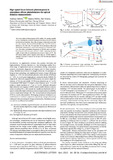Citation link:
http://dx.doi.org/10.25819/ubsi/10328Files in This Item:
| File | Description | Size | Format | |
|---|---|---|---|---|
| High-speed_focus-induced_photoresponse.pdf | 1.35 MB | Adobe PDF |  View/Open |
| Dokument Type: | Article | metadata.dc.title: | High-speed focus-induced photoresponse in amorphous silicon photodetectors for optical distance measurements | Authors: | Bablich, Andreas Müller, Maurice Kienitz, Paul Bornemann, Rainer Haring Bolívar, Peter |
Institute: | Department Elektrotechnik - Informatik | Free keywords: | 3D imaging sensors, 3D-Bildsensoren | Dewey Decimal Classification: | 621.3 Elektrotechnik, Elektronik | Issue Date: | 2022 | Publish Date: | 2023 | Source: | Electronics Letters ; 58 (8), S. 330–332. - https://doi.org/10.1049/ell2.12450 | Abstract: | The Focus-Induced Photoresponse (FIP) enables 3D sensing capabilities by evaluating the irradiance dependent non-linear detector response in defect-based materials. Since this advantage is intricately associated to a slow response, the electrical bandwidth of previous FIP sensors is limited to a few kHz only. We report the FIP in amorphous silicon pin photodiodes and propose a sensor read out based on a harmonics analyses. We achieve modulation frequencies of 500 kHz and a non-linear beat frequency detection up to at least 3.5 MHz, surpassing the bandwidth of state-of-the-art architectures by at least a factor of 175. The FIP sensors further achieve signal-to-noise ratios of ∼50 dB, depth resolutions of at least 5.4 mm at 126 cm and a DC FIP detection limit of 1.3 μW/mm2. |
Description: | Finanziert im Rahmen der DEAL-Verträge durch die Universitätsbibliothek Siegen |
DOI: | http://dx.doi.org/10.25819/ubsi/10328 | URN: | urn:nbn:de:hbz:467-25217 | URI: | https://dspace.ub.uni-siegen.de/handle/ubsi/2521 | License: | http://creativecommons.org/licenses/by-nc-nd/4.0/ |
| Appears in Collections: | Geförderte Open-Access-Publikationen |
This item is protected by original copyright |
Page view(s)
264
checked on Dec 1, 2024
Download(s)
28
checked on Dec 1, 2024
Google ScholarTM
Check
Altmetric
This item is licensed under a Creative Commons License


